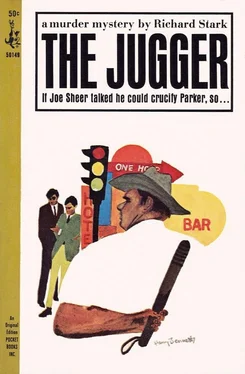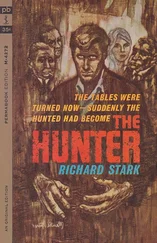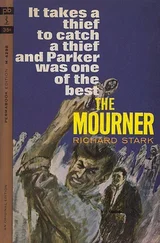“I certainly did enjoy our little chat the other day,” Younger told him. “I want to get to know all the folks that moved into town while I was away. I was in the Army, you know.”
Younger’s silence forced the old man to say something; he chose, “I didn’t know that.”
“Thirty years,” Younger told him, and nodded emphatically. “Retired a master sergeant. Just a few months ago, just retired, came back to the old home town, took over the police force, whipping it into shape. You’ve been in town just about five years, haven’t you?”
“Yes.”
“A fine town. You get down into the city often?”
“Sometimes.”
Younger already knew about that. He’d followed the old man on his last trip in, before starting this campaign. He knew now about the old man’s apartment in town. Sheer had stayed there two days that last time, and the second day he’d had visitors, three stocky men about Younger’s age. They’d driven up in a Plymouth with New York State plates, stayed the afternoon and evening, left about eleven-thirty at night. Younger had copied the license number down, but hadn’t done anything about it. Time enough if it was necessary.
What he figured, he figured those three men were bank robbers, too. Maybe Joe Sheer was retired, and then again maybe he wasn’t. Maybe these days he just drew up the plans for the robberies, let the younger men actually go in and do the jobs. Younger would find out, in time. He’d know everything there was to know, in time.
They rode in silence a while now, until Younger took out a cigar and began to unwrap it. A sign at the front end of the car said no smoking was allowed here, but Younger went on unwrapping the cigar, tossed the paper on the floor, stuck the cigar in his mouth, and reached for a match. Just before lighting it, he turned to the old man, saying, “That’s the advantage of being a policeman.” He grinned and winked.
The old man looked at him with distaste. “What is?”
Younger gestured at the no-smoking sign. “You can bend the law a little,” he said. He lit the cigar, puffed a halo of smoke, and tossed the match on the floor. “Now, you,” he said, “if you were to bend the law, we’d get you. Sooner or later we’d get you, even if it took twenty years.”
The old man said nothing at that, and they rode in silence again until Younger said, “Were you ever in the Army?”
“No.” The old man seemed about to stop there, but then he apparently had to justify himself. He added, “I failed the physical in the First War.”
“That’s too bad. The Army’s a great life, great life.”
“Maybe so.”
Younger started telling war stories then. He told the old man story after story about his Army days, some of them true, some borrowed, and some embroidered, some completely false. The old man listened stolidly, never speaking, sometimes looking out the window at the flat scenery going by, and Younger talked on and on and on.
When they arrived in Omaha, Younger walked with the old man out of the terminal. On the way, he said, “How long you staying in town?”
The old man shrugged. “A couple of days.”
“Maybe we’ll ride back together.” Younger smiled, happy and friendly.
The old man gave him a cold and thoughtful look, and then looked away. “Maybe we will,” he said.
“I wouldn’t be a bit surprised,” Younger said.
Neither of them were.
“Well, hello!”
The old man had just stepped out of the supermarket, a bag of groceries in his hands. He looked up and saw Younger standing there, and a shadow crossed his face. All at once he seemed ten years older.
Younger said, “That looks heavy. I’m going your way, I’ll give you a lift.”
“No, that’s all right, I—”
“No trouble at all.” Younger took the bag of groceries and started away with them, and the old man couldn’t do a thing but follow.
The police car was parked at the curb. Younger usually drove his own car, a small black Ford, but especially for today he’d borrowed the department’s brand-new squad car, a green-and-yellow car with a red dome light on the roof, a whip antenna on the left side, and the word POLICE in huge yellow letters on hood and trunk and both doors.
“Here we are.” Younger put the bag of groceries on the back seat, then held the front door open for the old man, who hesitated a dangerous fraction of a second before getting in. For just an instant there, Joe Sheer might have gone on the offensive, but the instant passed. Younger smiled at the old man’s back, then slammed the door and strode around the car to the other side and got behind the wheel.
The car was even more official-looking inside than out. The usual chrome-filled dashboard was supplemented by additional knobs for the dome light, and siren and spotlight, plus the two-way radio, plus a clipboard held to the top of the dash by a small magnet. The radio was switched on, breathing static and occasionally breaking into guttural voice.
There were seat belts in the car, and Younger made a production of fastening his, though he usually ignored such things. To the old man he said, “Better fasten your belt too, Joe. Safety first, right? You always want to be able to feel you’re safe, isn’t that right?”
His voice flat, the old man said, “I suppose so.” He fastened his seat belt with a click.
Younger started the car, and they glided silently through the traffic, sunlight glinting off the polished hood. After a minute, Younger laughed and said, “What’ll your friends think, huh, Joe? Anybody sees you go by in a police car, they’ll say, ‘Well, what do you know? The cops caught up with old Joe at last.’ You’ll have a lot of explaining to do, Joe.” He laughed some more, and shook his head at how funny it was.
The old man said, “What do you want, Captain? What do you want from me?”
Younger hesitated, but the time wasn’t ripe. He’d only been working a couple of weeks on this, and Sheer was still too tough. He’d be asking that question again some other time, with a lot less challenge in his voice. So this time all Younger said was, “I’ll take a cup of coffee, Joe, but that’s all. If I let you pay me to drive you home, the cabbies’d all be after me.” He laughed, and winked, and jabbed his elbow into the old man’s arm.
Sheer kept looking at him, as though he were going to say something else, but after a minute he sat back and looked out at the traffic, and another dangerous moment had passed.
Two blocks later they passed a house with a FOR SALE sign out on the front lawn. Younger pointed at it and said, “I know those folks, and they’re crazy. You know that, Joe?”
The old man frowned. “Are they?”
“Sure they are. To sell a house now, move out of town like they’re doing, it just doesn’t make any sense. The timing’s all wrong for it, the market’s off in houses and the whole thing is just a terrible loss all the way around.” He shook his head. “I would tell anybody, Joe, right now is the worst time in the world to think about moving. Absolutely disastrous, Joe.” He laughed and said, “Why, I wouldn’t even go away for a visit right now. No, sir. This is a time to stay put right here in good old Sagamore. You know what I mean, Joe?”
The old man said, “I know what you mean.” Already there was a bit less toughness in his voice.
Younger sat in his office and looked at the telephone. Call now? Or wait a little longer?
He hadn’t seen the old man for three days now. He had the old man worried, had him knowing Younger was watching him for something or other, and now he just pulled back a little bit, sat back, let the old man start to sweat. That was all, just give him time to sweat, time to think.
Читать дальше












